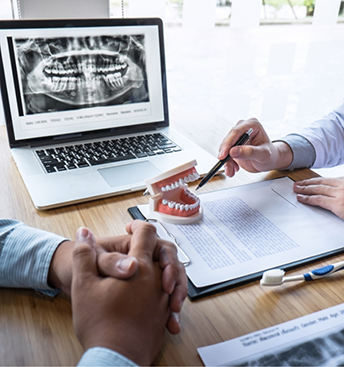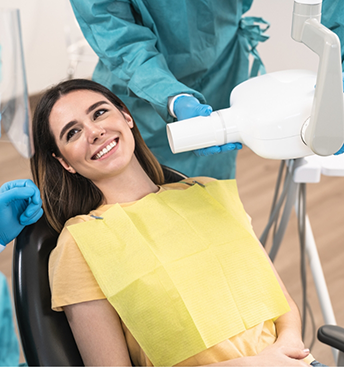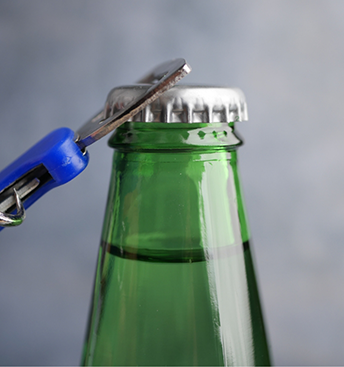Emergency Dentist Winthrop
Broken Tooth? Serious Pain? We’re Here to Help
Dr. Howard Brooks and Dr. Stephanie Brooks, as well as our specialists, Dr. Julianne Bruno and Dr. Andrea Shah, believe in being there for you when you need us most. If you or a loved one encounter a severe oral injury or a toothache, we are here to help. We strive to offer same-day help for dental emergencies whenever possible. This approach lets us provide solutions that help you regain a complete, pain-free smile. So, go ahead and contact us for custom emergency dentistry in Winthrop today.
Why Choose Brooks Dental for Emergency Dental Care?
- Same-Day Dental Emergency Appointments Available
- In-House Endodontist & Orthodontist on Staff
- Compassionate Care Using the Latest Dental Techniques
How We Treat Dental Emergencies

- A Same-Day Appointment. When you call us, we’ll schedule your appointment as soon as possible. This visit will likely be on the same day. While you wait, our staff will also give you custom first-aid tips over the phone.
- An Emergency Exam. During your visit, we’ll first perform a quick emergency exam. Doing so shows us the source and extent of your problem. It also lets us see how to relieve your immediate pain.
- Review of Findings. After the exam, our dentists will review their findings with you; they’ll even suggest possible procedures. From there, they’ll draft a custom treatment plan that meets your needs. This last bit will include the estimated price and timeline for your care.
-
Proper Dental Care. Finally, our team will quickly address your oral issue. We can handle fillings, crowns, root canal therapy, and more, so you can trust us!
The Most Common Dental Emergencies
Dental emergencies may include a toothache, a cracked tooth or crown, any noticeable swellings in the mouth, jaw pain, a broken denture or prosthesis, or a fall or traumatic injury to the teeth or mouth. The list goes on! At Brooks Dental, our providers are here for you when the unexpected happens. Whether you’re in discomfort or there is something you are nervous about, contact us right away and we will be sure to see you for a same-day appointment.
Understanding the Cost of Emergency Dentistry

Naturally, you may fear that dental emergency care exceeds your budget. Drastic problems can sometimes involve extreme prices. However, the actual cost of a dental emergency varies by patient. You’ll have to see our dentists to get an exact treatment estimate. Still, our office will work to make your treatment affordable. More specifically, our knowledgeable front desk team will guide you through the pricing factors associated with emergency care as well as discuss our various payment options. This process will help relieve your stress about dental costs.
Every Dental Emergency is Different

Even if two patients come with the same symptoms, it doesn’t necessarily mean their treatment will cost the same because the underlying problem could be different. Also, the severity may vary as well as the repairs needed to get their smile back to full health again. With so many possible scenarios that would be considered a dental emergency, it’s impossible to estimate how much treatment would be for the “average” case.
Does Dental Insurance Cover Dental Emergencies?

Coverage and benefits will vary from plan to plan, but dental insurance usually includes emergency care. Keep in mind that the emergency exam and your treatment are considered two different services, which means that they may be covered at differing rates. As an example, dental crowns and root canal treatment are usually covered at about 50 percent by insurance, which means you’re responsible for paying the other half. When you come in, our front desk team can check on your coverage and help you take full advantage of the benefits you’re entitled to.
Other Options for Making Dental Emergencies Affordable

When you have a dental emergency, you shouldn’t have to worry about paying for unexpected treatment upfront. With Cherry financing, you can make payments over time. The application process is fast and easy, and payment plans are flexible.
In addition, the sooner you seek help from Drs. Howard or Stephanie Brooks, Dr. Julianne Bruno, or Dr. Andrea Shah, the better. Waiting to come in only gives the problem more time to worsen. Dental issues do not heal or get better on their own, which means you need to reach out to us as early as possible. The longer you postpone emergency care, the more expensive it will become.
Taking Care of Your Smile Can Save You Money

Some mistakenly think they will spend less money by only going to the dentist when a problem comes up, but—as the saying goes—an ounce of prevention is worth a pound of cure. In other words, preventive care, which comes at a much lower price, can help you avoid costlier procedures. In fact, according to the University of Illinois Chicago, every dollar a patient spends on prevention saves an average of between $8 and $50 in emergency and restorative care!
Keys to Preventing Dental Emergencies

As you’d expect, it’s always better to prevent a dental emergency in Winthrop than to manage one. The latter scenario involves more time, money, hassle, and often pain. Thankfully, you have the power to reduce your risk of urgent oral problems. All you need to do is integrate certain oral habits into your lifestyle. Although some emergencies are unavoidable, having these habits will help you steer clear of the most unnecessary problems.
Visit Your Dentist Regularly

If you are not currently doing so, attend your regular dental checkups with our dental office every six months. These visits are meant not only to polish your teeth but also to diagnose and treat small issues before they get bigger. As a result, we can resolve problems as early as possible, sparing you the trouble of cavities, broken teeth, and more.
Maintain Good Oral Hygiene at Home

Caring for your smile isn’t just a semi-annual task. It requires daily effort through cleaning your teeth and gums at home. Otherwise, plaque and tartar can build up and cause dental infections. As a result, you should brush at least twice and floss at least once every day. These little efforts can keep harmful bacteria and acids under control.
Stick to a Nutritious Diet

A balanced diet not only ensures that your body receives the vitamins and minerals it needs to fight infection and stay healthy, but it also helps keep the microbiome of your mouth in check. Sugary, starchy foods and drinks can encourage bad bacterial growth, which leads to decay or infection. Making smart choices in your diet, such as not chewing on ice, can also minimize chips and cracks in your teeth.
Wear a Mouthguard

Are you involved in contact sports? When you play football, rugby, or lacrosse, you must have a mouthguard, but even non-contact activities like soccer, basketball, or skateboarding can involve occasional blows to the face. Unfortunately, store-bought mouthguards often feel uncomfortable or don’t stay where they’re supposed to. We can provide a custom mouthguard, which is precisely fabricated for your teeth, making it much more likely that you’ll actually wear it when you need it!
Use Tools to Open Packages, Not Your Teeth

Opening bags or bottles may seem simpler if you use your teeth, but your pearly whites were not designed to bite into these hard objects. To prevent chipping and cracking, take a few extra minutes and get a pair of scissors or whatever you need to safely open the packaging.
I Need a Checkup & Cleaning I Want to Enhance My Smile I Have a Cavity or Broken Tooth I Want a Straighter Smile I am Interested in Dental Implants I Have Missing Teeth I Have Sleep Apnea /Snore View Our Services
